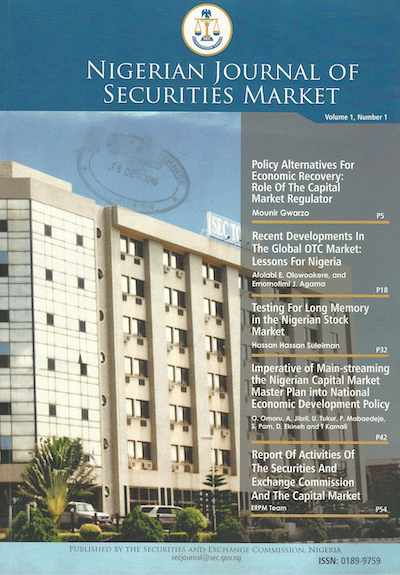NJSM – Volume 1, Number 1

Policy Alternatives for Economic Recovery: Role of the Capital Market Regulator – Mounir Gwarzo
Abstract:
The Securities and Exchange Commission (SEC) is statutorily mandated to regulate and develop the Nigerian capital market. This paper, after reviewing the relevant literature and evidence, explains a number of policy tools the SEC has pursued in order to develop and further deepen the capital market. Ultimately, this enhances the prospects of fiscal actions of taxation and expenditure to be more useful tools of aiding recovery and growth. While making a case for the re-continuation of privatization in view of the fact that private firms, expectedly perform better than state owned enterprises, the paper cautions the need for closer regulation and concludes that the current wave of regulatory innovations is in tandem with capital market development and economic recovery and growth.
Recent Developments in the Global OTC Market: Lessons for Nigeria – Afolabi E.Olowookere, Emomotimi J.Agama
Abstract:
The global OTC market is witnessing significant changes in recent times as more attention is paid to issues surrounding Electronic Trading Platforms, Central Counterparties, Exchange-Traded Derivatives, Trade Repositories, among others. These developments are redefining how financial transactions are conducted and also blurring the lines between activities of traditional OTC and organised exchanges. This study therefore assesses these developments and draws policy lessons that are relevant to Nigeria in order to further strengthen the recent development in the regulation and operations of the country’s OTC market.
Testing for Long Memory in the Nigerian Stock Market – Hassan Hassan Suleiman
Abstract:
This paper examines the issue of long memory dependence in the Nigerian stock market in order to provide fresh evidence on its efficiency. Using monthly returns from the Nigerian Stock Exchange for the period January 2000 to July 2016 and applying the GARCH-class models, the results show a significant evidence of long memory in the data. The findings reject the weak form efficiency hypothesis as past information can be used in forecasting returns in the stock market. It is recommended that further research to identify the causes of the inefficiency should be undertaken. On its part, the SEC should strengthen measures that boost liquidity and encourage investor education as well as other initiatives that could drive the market closer to efficiency
Imperative of Mainstreaming the Nigerian Capital Market Master Plan into National Economic Development Policy – Ojomo Umaru, Aziza Jibril,Usman Tukur, Peter Mabadje, Samson Pam, Daisey Ekineh and Tunde Kamali
Abstract:
The Nigerian economy is facing significant challenges inhibiting the attainment of its full potential. On its part, government has been implementing policies aimed at addressing the challenges by running expansionary budgets, investing in infrastructure and further diversification of the economy. The capital market has proven to be one of the key sources for mobilizing the funds needed to finance these lofty objectives. In order to reposition the market to serve its numerous purposes, the Securities and Exchange Commission has developed a ten-year capital market master plan. The plan outlines ambitious initiatives whose implementation will engender the emergence of a more robust capital market capable of financing socioeconomic development priorities of government. To enhance chances of its implementation success, there is the need to mainstream the master plan into national economic policy